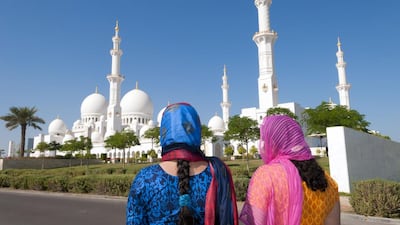Uzma Irfan, 38, from Bengaluru, did not travel overseas until she was 16. But these days, the director at a property company in the city makes sure she travels abroad every year for three weeks with her husband and their daughter, Alayna – who, at 10, has already sailed across the Mediterranean on a luxury cruise liner, trekked in Canada’s Rocky Mountains and basked on the beaches of Australia’s Gold Coast.
“Every year we think of a different place,” says Ms Irfan. “Now my daughter is doing some research on where we’ll go in Norway this year. We want to go and do something different, unique, interesting.”
Luxury travel is on the rise in India.
According to a report on luxury travel by Amadeus, a Madrid-based company that provides technology to the travel industry, India’s luxury travel market has a projected annual growth rate of 12.8 per cent between 2015 and 2025.
The Indian sector’s expected growth rate was the highest of all 25 countries studied in the Amadeus report.
Naturally, a great many companies are increasingly making efforts to target Indian luxury travellers.
“There are hotels that are coming in, there are destination management companies, there are countries coming in,” says Chhavi Chadha, the founder of Bespoke, a boutique luxury travel company in New Delhi, which counts some of India’s industrialist families and Bollywood celebrities among its clients.
“It’s a great market because the spending power is there. That’s why India is coming into notice. Everybody is trying to tap into the market.”
Neelu Singh, the chief executive of Ezeego1, an online travel booking company, says that rising wealth means India is becoming “one of the biggest luxury source markets” – and wealthy Indians are prepared to spend a lot on their holidays.
“For outbound luxury travel, the money spent is between 500,000 rupees [Dh28,570] and 600,000 [for two people] for a short-haul destination, whereas for a long-haul destination, Indians don’t mind spending up to 1 million rupees.”
The number of super wealthy individuals – defined as those with wealth of US$30m or more, excluding their main residence – in India has increased over the past decade by 500 each year, according to Knight Frank’s wealth report, released last month. India is expect to add an extra 1,000 super wealthy individuals every year over the next 10 years, says the company.
The Dubai-based luxury hotel group Jumeirah, which manages Burj Al Arab and Jumeirah Beach Hotel, as well as hotels in London, Shanghai and Istanbul, is one of the latest to step up its efforts to tap India for guests. Jumeirah said this month that it will open a representative office in India, under Blue Square Consultants, to increase sales to high-end travellers.
“India has always been a top source market for Dubai. However, in recent years, we have noticed an increase in luxury travellers from this region to our properties around the world, in particular Dubai, London and the Maldives,” says Alison Broadhead, Jumeirah Group’s chief commercial officer.
The extent of the interest in India as a source market for tourists was evident at a three-day trade show that in Mumbai in February, called OTM, which drew representatives from 60 countries’ tourism marketing boards and hotels from destinations including Maldives, Thailand and the UAE.
The Abu Dhabi Tourism and Culture Authority has said it is expecting 15 to 17 per cent growth in the number of Indian tourists this year. India already accounts for the largest number of tourists to Abu Dhabi.
Karan Anand, the head of relationships at Cox & Kings, a luxury travel company in India, says that the UK, France, Italy, Seychelles, Maldives, Dubai and Bali are some of the most popular holiday spots for Indian travellers.
Premium cruise packages are also becoming an increasingly attractive option for high-end holidays to locations including the Mediterranean and the Caribbean, as well as Alaska and Canada, Mr Anand says.
The growth of India’s luxury travel market is significantly outpacing the rise of overall travel in the country, which is projected to increase by about 7.5 per cent annually between 2015 and 2025.
Indians are becoming more adventurous as travellers, says Ms Chadha. “They’ve done the usual destinations,” she says.
“During summers, they’ve all done the usual Paris and London. The question is what can those destinations offer? A lot of Indians are seeking new experiences, whether its wildlife in Kenya, Iceland, Croatia, wine tours, skydiving. We have to find places they haven’t been to and they’ll really enjoy.”
Although wealthy Indians are prepared to spend large amounts of cash on their holidays, Ms Chadha says that the Indian mindset is always geared towards making sure they are getting value for money.
“The Indian market naturally likes bargains,” she says. “Whether it’s luxury to whatever end it is, they do like a little element of what is special for us? That will remain because it’s very inherent.
“But definitely, if Four Seasons is the best hotel in Florence, they want to get the best hotel and best experience there. I do notice that budgets are sometimes exceeded for the experience or for the brand.”
For Ms Irfan, their annual family holiday is the highlight of the year and she plans to keep taking Alayna to far-flung destinations.
“The world is such a big place,” she says.
business@thenational.ae
Follow The National's Business section on Twitter

